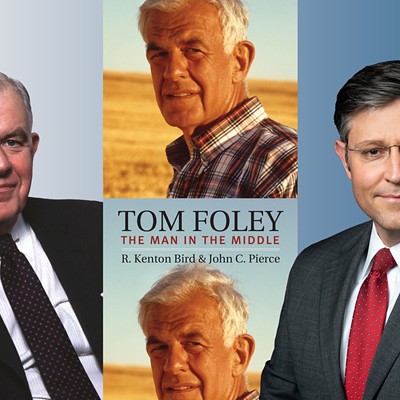David Condon received just 30 percent of the primary votes, even though he raised a third again as much money as Mayor Mary Verner.
Now he moves on to the general election having to climb a steeper hill than he, and I suspect, his highroller donors ever anticipated.
So who is this newcomer to Spokane politics?
Condon grew up in Spokane in a prominent local family, high school at Gonzaga Prep, onto Boston College, dabbled in small business endeavors for a time, then the Army.
He plays heavily on that military experience in his campaign biography, but … hold it, stop the videotape. Let’s roll back a few frames on that website: I’m having trouble with that run-on sentence that regales us with his army accomplishments:
“He served as the Operations Officer for the 47TH Combat Support Hospital, Fort Lewis, WA which included a rotation at the Joint Readiness Training Center. His final assignment was at A Company, 396th Combat Support Hospital (Reserve) as the Commander, which was activated for Operation Enduring Freedom.”
Not to dismiss anyone’s military service, but it’s the word “Commander” — with a capital “C” — that seems out of place, wedged in. The sentence should read simply, “…he commanded a company,” which, we know, is a routine assignment for young captains learning how to do it. Not a lot of zing to that line, however — no panache. But “Commander” — now that sounds important. Might it be that “sounding important” was the point? For the record, the 47th Support Hospital over at Fort Lewis is commanded by a colonel.
Or take his line “…was activated for Operation Enduring Freedom.” Did his unit then head to Iraq? He doesn’t say.
Condon then moves on to his six years as Cathy McMorris Rodgers’ administrative assistant. Again he seems to inflate his role.
“David led the staff through major district projects that have included the 2005 BRAC process ultimately resulting in the Fairchild Air Force Base staying open.”
Is he really taking credit for keeping Fairchild open? Come on, the final Base Closure Commission recommendations were all but completed prior to Condon even beginning work for McMorris; they became law shortly after he arrived in McMorris’s office.
This inflated claim reads right out of Nixon’s “Checkers” speech. Recall the line: “I went to the South Pacific … I was just there when the bombs were falling.” Truth was, Nixon never came within 500 miles of a bomb falling; hell, the story is told that Dick Nixon won enough playing poker to pay off his law school debts.
The Base Closure Commission was established by Congress specifically to shelter decision-makers from the McMorrises of government, let alone their then-29-year-old administrative assistants.
All these big bucks to back a mayoral candidate who has never been near local government, has little political history with the city, and next to zero relevant administrative experience; yet he presumes to hold the highest elective office in the city? What gives?
Follow the money — that’s a good place to begin.
And who are those 60-some-odd people who, almost overnight, came up with $800 each (and likely will come up with another $800 for the general election)? Are they right-wing Republicans whose idea of “good government” begins and ends with attacks on unions and public servants? Or maybe Tea Party advocates who want to do to Spokane what they are doing to the national government? Or how about a fifth column, distinct from, but compatible with, both of the above?
The data show that Mr. Condon’s support comes from an unusually high number of packaged contributions — multiple donations from, in reality, single sources (e.g. husband, wife, kids, cousins, all donating separately). A number come from former members of Mayor Dennis Hession’s economic development team: John Pilcher, his assistant Teresa Sanders, and friends who shared the agenda of this staff.
Best guess? When Mr. Condon says he “wants the city to partner with business,” we can translate this to mean that his high-end supporters expect him, if elected, to give them preferred access that they will exploit with the intent of taking the city back to the future.
And what would this mean? During the Hession/ Pilcher/Sanders term, hard-won neighborhood needs and concerns lost all priority. That administration effectively declared war on historic neighborhoods, even to the point of refusing to support the Comprehensive Land Use Plan, along the way arrogantly ignoring the unanimous resolutions of two neighborhood councils. Then there was the garbage fiasco in Corbin Park. These folks marched for a different constituency.
They also took dead aim at the city’s award-winning Community Development Block grant program, firing the longtime director (who was rehired by Mayor Verner). As for revitalization of Browne’s Addition and Lower Perry, along with the rehabbing of hundreds of homes? Forget it. They had bigger fish to fry down in Hession’s City Hall. It was to be their way or the highway. They governed through a narrow cadre and favored hiring loyalists.
The implicit message we take from Mr. Condon’s resume, when viewed along with the friends he keeps: “If you liked the Hession administration, you will love a Condon administration.”























